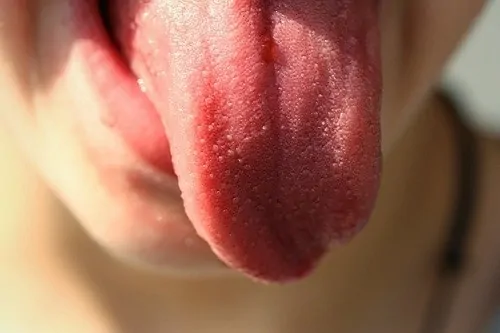
We all know that dentists are responsible for overseeing the health of our teeth. But the truth is, your dentist in Chapel Hill is actually responsible for much more than teeth alone. Your dental team is dedicated to protecting your overall health, and one area that’s of particular interest to your dentist is your tongue. Believe it or not, your tongue can say a lot about your overall health and can show early warning of signs of some serious health conditions.
At your bi-annual dental checkups, your dentist and hygienist will take a close look at your tongue. But what exactly are they looking for? First, your dental team will look for any changes in your tongue’s texture since your last appointment, paying particular attention to any bumps or lumps. Next, your dentist in Chapel Hill will look for any tongue discoloration. A healthy tongue will be pink and covered in teeny tiny bumps called papillae. An unhealthy tongue or one that may be showing signs of a bigger problem may have any of the following:
1) Black and Hairy – Looking into the mirror and seeing a black, hairy tongue can certainly cause someone to panic. But, however scary and gross this may seem, chances are that a black, hairy tongue is nothing to fear and is usually temporary. It may also help to know that the hairy appearance isn’t actually hair. It’s often a buildup of dead skin cells on the papillae, which causes the normally tiny bumps to take on a long, stringy appearance.
2) A Sore, Bumpy Tongue – Every tongue naturally has a bumpy texture, and not every bump is worrisome. However, when a new bump appears and lasts for more than two weeks, or is accompanied by pain or soreness, it may be time to see your dentist in Chapel Hill. A lump or bump that doesn’t go away may be an early warning sign of oral cancer, and it’s best to get it checked sooner rather than later.
3) Ridges – Changes in tongue texture may initially be concerning, but ridges or a scalloped appearance on the edges of the tongue are typically harmless.
4) White Spots – When your tongue appears to be coated in white spots, you may be experiencing oral thrush or leukoplakia. Oral thrush is an infection caused by Candida yeast while leukoplakia is a result of tobacco use or alcohol use. Sometimes, leukoplakia can develop into oral cancer.
We always recommend that you keep a close eye on your tongue’s health in between your visits, too. If you notice any changes in texture or color or develop sores, contact your dentist in Chapel Hill as soon as you can.